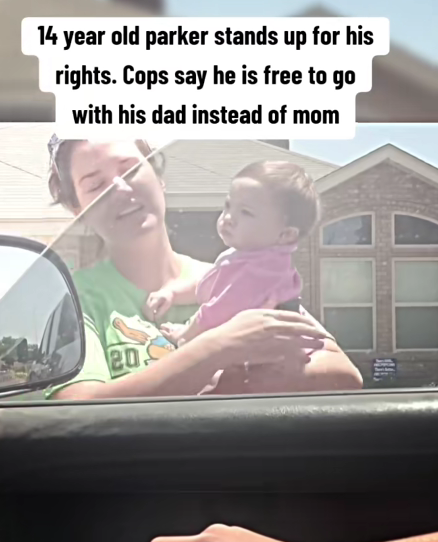A family dispute turned into an unexpected viral moment when 14-year-old Parker stood up for his rights in front of police officers, ultimately choosing to go with his father instead of his mother. The emotional scene unfolded in a suburban neighborhood, highlighting the challenges of custody battles and the voice children increasingly demand in such conflicts.
According to reports, Parker’s parents have been locked in an ongoing custody dispute. On this day, tensions boiled over when Parker openly expressed his wish to live with his dad. His mother, holding a younger sibling during the confrontation, was visibly upset as Parker voiced his decision.
Bodycam and cellphone footage captured the moment officers intervened to ensure the situation remained calm. The officers explained to Parker and his parents that, given his age, he had the right to make his preference known. “You’re free to go with your dad if that’s what you want,” one officer can be heard saying.
Parker didn’t hesitate. Standing his ground, he made it clear he wanted to leave with his father. The officers facilitated the decision, ensuring that the exchange was handled without escalation. His mother, though distressed, complied with the officers’ instructions, while Parker walked confidently toward his dad’s vehicle.
The video quickly spread online, resonating with viewers who saw it as a powerful moment of a young teen taking control of his future. Many praised Parker for his courage, noting how difficult it can be for children to speak up in custody situations. Others expressed empathy for the mother, pointing out the heartbreak of watching a child choose the other parent in such a public way.
Family law experts explain that while custody orders are typically determined by courts, older children often have a say in where they want to live. In many states, once a child reaches the age of 12 to 14, judges and officers are more inclined to consider their preferences, provided the choice is in the child’s best interest.
The case has also sparked a larger conversation online about how children should be included in custody disputes. Advocates argue that too often, kids are caught in the crossfire of bitter legal battles, forced to remain silent as decisions are made around them. Parker’s case, they say, is a rare example of a child asserting his voice—and being heard.
For now, Parker is living with his father, while legal teams review the long-term custody arrangement. Though the situation is far from resolved, one thing is certain: a 14-year-old’s bold decision has not only reshaped his own life but has also reminded parents everywhere that children’s voices matter.
